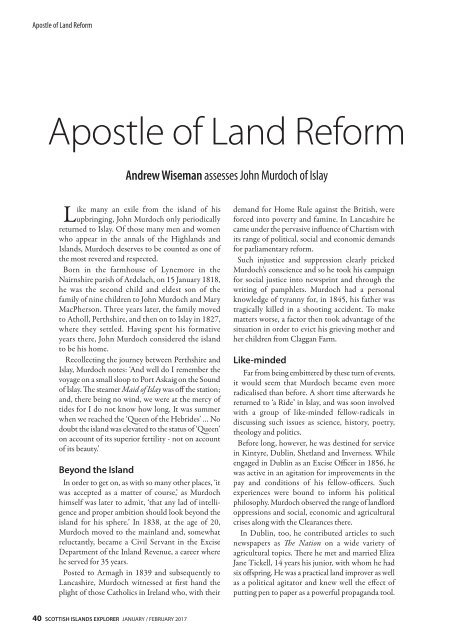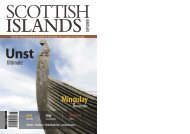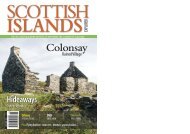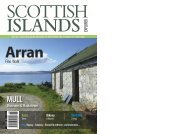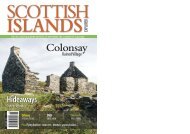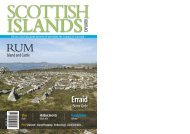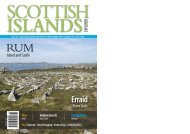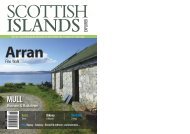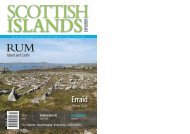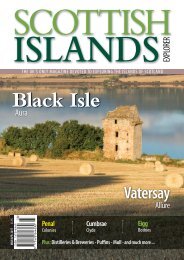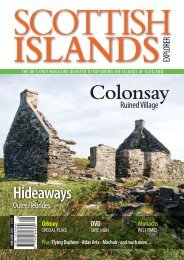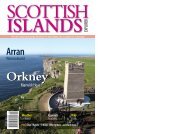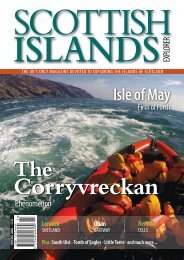Create successful ePaper yourself
Turn your PDF publications into a flip-book with our unique Google optimized e-Paper software.
Apostle of Land Reform<br />
Apostle of Land Reform<br />
Andrew Wiseman assesses John Murdoch of Islay<br />
Like many an exile from the island of his<br />
upbringing, John Murdoch only periodically<br />
returned to Islay. Of those many men and women<br />
who appear in the annals of the Highlands and<br />
<strong>Islands</strong>, Murdoch deserves to be counted as one of<br />
the most revered and respected.<br />
Born in the farmhouse of Lynemore in the<br />
Nairnshire parish of Ardclach, on 15 <strong>Jan</strong>uary 1818,<br />
he was the second child and eldest son of the<br />
family of nine children to John Murdoch and Mary<br />
MacPherson. Three years later, the family moved<br />
to Atholl, Perthshire, and then on to Islay in 1827,<br />
where they settled. Having spent his formative<br />
years there, John Murdoch considered the island<br />
to be his home.<br />
Recollecting the journey between Perthshire and<br />
Islay, Murdoch notes: ‘And well do I remember the<br />
voyage on a small sloop to Port Askaig on the Sound<br />
of Islay. e steamer Maid of Islay was off the station;<br />
and, there being no wind, we were at the mercy of<br />
tides for I do not know how long. It was summer<br />
when we reached the ‘Queen of the Hebrides’ … No<br />
doubt the island was elevated to the status of ‘Queen’<br />
on account of its superior fertility - not on account<br />
of its beauty.’<br />
Beyond the Island<br />
In order to get on, as with so many other places, ‘it<br />
was accepted as a matter of course,’ as Murdoch<br />
himself was later to admit, ‘that any lad of intelligence<br />
and proper ambition should look beyond the<br />
island for his sphere.’ In 1838, at the age of 20,<br />
Murdoch moved to the mainland and, somewhat<br />
reluctantly, became a Civil Servant in the Excise<br />
Department of the Inland Revenue, a career where<br />
he served for 35 years.<br />
Posted to Armagh in 1839 and subsequently to<br />
Lancashire, Murdoch witnessed at first hand the<br />
plight of those Catholics in Ireland who, with their<br />
demand for Home Rule against the British, were<br />
forced into poverty and famine. In Lancashire he<br />
came under the pervasive influence of Chartism with<br />
its range of political, social and economic demands<br />
for parliamentary reform.<br />
Such injustice and suppression clearly pricked<br />
Murdoch’s conscience and so he took his campaign<br />
for social justice into newsprint and through the<br />
writing of pamphlets. Murdoch had a personal<br />
knowledge of tyranny for, in 1845, his father was<br />
tragically killed in a shooting accident. To make<br />
matters worse, a factor then took advantage of the<br />
situation in order to evict his grieving mother and<br />
her children from Claggan Farm.<br />
Like-minded<br />
Far from being embittered by these turn of events,<br />
it would seem that Murdoch became even more<br />
radicalised than before. A short time aerwards he<br />
returned to ‘a Ride’ in Islay, and was soon involved<br />
with a group of like-minded fellow-radicals in<br />
discussing such issues as science, history, poetry,<br />
theology and politics.<br />
Before long, however, he was destined for service<br />
in Kintyre, Dublin, Shetland and Inverness. While<br />
engaged in Dublin as an Excise Officer in 1856, he<br />
was active in an agitation for improvements in the<br />
pay and conditions of his fellow-officers. Such<br />
experiences were bound to inform his political<br />
philosophy. Murdoch observed the range of landlord<br />
oppressions and social, economic and agricultural<br />
crises along with the Clearances there.<br />
In Dublin, too, he contributed articles to such<br />
newspapers as e Nation on a wide variety of<br />
agricultural topics. ere he met and married Eliza<br />
<strong>Jan</strong>e Tickell, 14 years his junior, with whom he had<br />
six offspring. He was a practical land improver as well<br />
as a political agitator and knew well the effect of<br />
putting pen to paper as a powerful propaganda tool.<br />
40 SCOTTISH ISLANDS EXPLORER JANUARY / FEBRUARY <strong>2017</strong>


